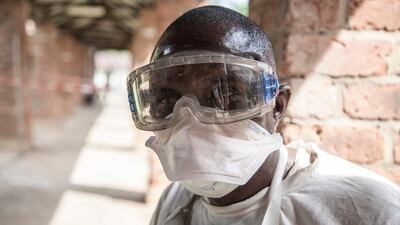On the humid and grassy plains of North Kivu, in the Democratic Republic of the Congo, a group of refrigerators are humming; inside them are life-saving vaccines for the deadly Ebola virus. They serve as a symbol of the ingenuity and courage demonstrated by health workers, who wade into environments from which most would flee.
As of Monday, more than 30 people had died in the latest outbreak while the DRC health ministry has identified 43 more suspected cases of Ebola in two provinces already racked by violence between dozens of armed groups. With more than one million displaced people living in those provinces, it is now a race against time to vaccinate those who might have been in contact with the infected.
The bravery of the two health workers who have already died should be a lesson to us all. Yet this is not an African problem but a global one. And the manner in which the world responds is an indicator of the foresight of the international community.
The DRC is the birthplace of the virus, which acquired its name from Congo’s Ebola river in the 1970s. But it was in West Africa in 2014 that Ebola was at its most deadly, killing more than 11,000 people as it decimated weak health systems in Sierra Leone, Liberia and elsewhere.
The lethargic response of the World Health Organisation caused much soul-searching within the body, which elected its first African director general, Ethiopian Tedros Adhanom Ghebreyesus, last year. In Africa, certainly, investment in primary care clinics and local training in diagnostics and treatment would help contain viruses when they arise.
But epidemics are by their very nature surprising and vast swathes of the globe are vulnerable to contagion. In 2016, the Zika virus spread across Latin America, even reaching the United States.
Yemen, in the grip of the Iran-backed Houthi rebels, is suffering the world’s worst cholera outbreak. Only when these problems are viewed as global threats can they be adequately handled.
The international community should support the WHO and bolster local prevention and emergency response because the response to Ebola today sets the tone for outbreak response elsewhere tomorrow.

